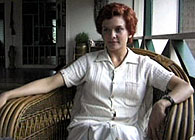|
|
|
|
In
a Savage Land
|
 |
|
In a Savage Land begins in the 1930s. Philip (Martin Donovan) and Evelyn (Maya Stange), an anthropologist couple, travel to the Trobriand Islands in Papua New Guinea for the sake of apparently important, ground-breaking research – something to do with sex, power, men and women. Director and co-writer Bill Bennett irritatingly never gets a fix on the specific details of the couple's work. Nor does he ever quite convince us of the reality of Evelyn's plucky, proto-feminist zeal, or Philip's turnabout from saucy, larrikin lecturer to crushing, repressive patriarch. Nothing much matters in this movie except Evelyn's romantic voyage away from Philip and towards the smouldering, sensitive Mick (Rufus Sewell), a pearl trader. It is clear what inspires Evelyn: the sight of those anonymous, lusty natives cavorting in a stream convinces her that white, civilised women must buck their missionary position. It is always an egregious mistake to expect artists to be accountable to what are amusingly called "the current debates". Bennett is, of course, free to tell any story that moves or inspires him. But In a Savage Land is so far displaced from contemporary sensibilities it becomes risible, even offensive. The film is undone by its own contradictions. It pretends to be a bleeding-heart lament over imperialism's effect upon native culture – yet it persists in showing the natives, through settler eyes, as an indistinct mass (dancing, fighting, laughing). No individual Trobriand islander is central to the story. At issue in this tale is the destruction of a complex island culture. Yet Bennett hardly seems interested in showing the war which eventually hits the island from the viewpoint of the natives who are devastated – all he cares about (English Patient-style) is the fraught prospect of Evelyn and Mick ever finding each other amidst the turmoil. The supreme, giveaway moment comes late in the movie when Bennett shows us what he clearly considers the most tragic result of colonialism in this part of the world – those previously uninhibited natives now have to wear less revealing clothes. No other sign of cultural genocide is offered or explored. This moment reveals the retrograde, blinkered, hippie-era orientation of the project. The film's single-minded obsession with the sexuality of the islanders serves, ultimately, only to pinpoint the personal problems of the white protagonists as they grope towards some nebulous state of liberation. In this light, the lengthy sequence in which Evelyn decides to go native – covering herself with dirt and sitting, silent and naked, inside a cage for a couple of months – is stupefyingly ludicrous and ill-judged. This level of overstatement is topped only by the clumsy, caricatural presentation of the local, colonial administrator (Max Cullen) – an easy target for right-on satire. Bennett made his commercial and artistic breakthrough with Kiss or Kill (1997). With the more handsomely resourced In a Savage Land, however, he has returned to the foggy confusions and meandering manner of his earlier works. He brings energy, conviction and skill to his projects – but, like so many Australian filmmakers, what he needs now is a coherent and thoughtful attitude towards the sensationalist stories his movies tell. MORE Bennett: Deck Dogz, The Nugget, Two If by Sea © Adrian Martin October 1999 |
![]()